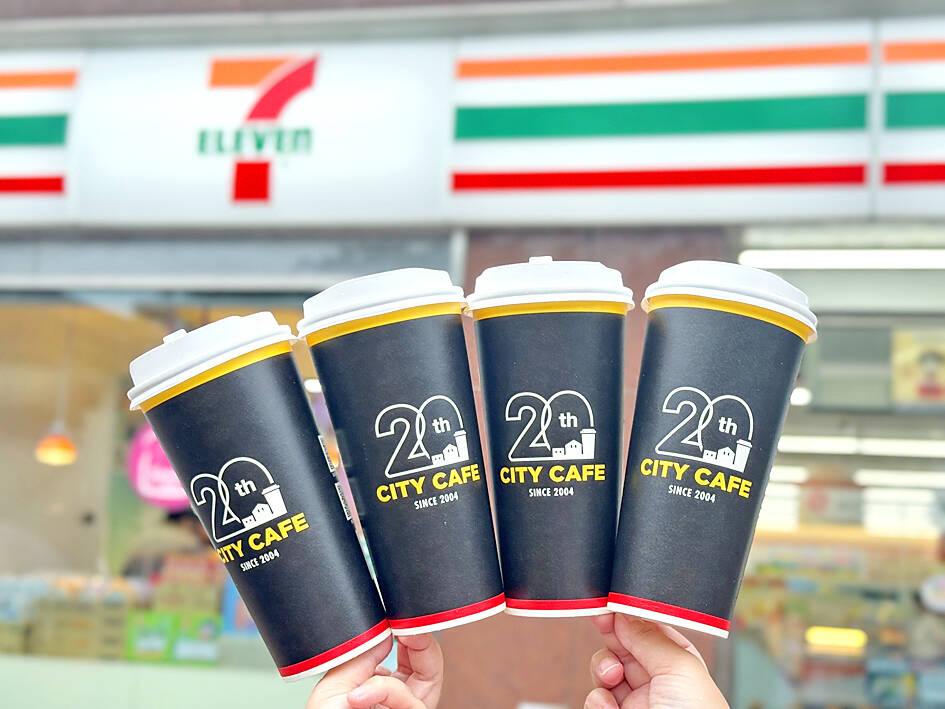Starbucks Corp might have the more recognizable name, but 7-Eleven’s City Cafe remains the king of Taiwan’s fresh coffee market, helped by the convenience store chain’s extensive market presence and product diversification.
President Chain Store Corp (PCSC, 統一超商), which runs both the 7-Eleven and Starbucks store chains in Taiwan, established the City Cafe brand in 2004.
The brand took off when actress Gwei Lun-mei (桂綸鎂) became its spokesperson in 2007.

Photo courtesy of President Chain Store Corp
City Cafe’s sales exceeded NT$10 billion (US$311.69 million) for the first time in 2015, surpassing the revenue of Starbucks Taiwan, and rose to more than NT$17 billion last year, exceeding the NT$14.98 billion in sales posted by Starbucks Taiwan.
Those figures, confirmed at PCSC’s investor conference last month, far outpaced the growing fresh coffee businesses of other convenience store chains operated by Taiwan FamilyMart Co (全家便利商店) and Hi-Life International Co (萊爾富).
Part of City Cafe’s success is the popularity and extensive network of the 7-Eleven chain, and with the number of 7-Eleven stores expected to reach 7,000 this year, analysts believe City Cafe sales could reach a new high of almost NT$20 billion this year.
Diversifying its coffee brands has also paid dividends, PCSC said.
With City Cafe celebrating its 20th anniversary this year, PCSC said that 7-Eleven has recently extended its brand offerings from affordable City Cafe to speciality coffee City Prima.
Having a range of products that makes its coffee appealing to more customers has helped City Cafe maintain its leading position in the freshly brewed coffee market, the company said.
Latte and Americano account for 40 percent of City Cafe sales, respectively, while other flavored coffee drinks account for the remaining 20 percent, it said.
Another convenience store chain, FamilyMart, launched its Let’s Cafe brand in 2006 and hired actor Mark Chao (趙又廷) to serve as its spokesman in 2009.
Let’s Cafe generated about NT$7 billion in revenue last year, with classic coffees and single-origin coffees accounting for 45 percent and 55 percent of its fresh coffee sales, respectively, the company said.
Hi Life is trying to carve out a larger share of the market, and spent up to NT$100 million in April to upgrade and refresh its Hi Cafe brand.
Hi Life’s Hi Cafe generated NT$2 billion in revenue last year. Sales up 50 percent year-over-year this year, on pace to push sales up to NT$3 billion for the year as a whole, the company said.

South Korea’s equity benchmark yesterday crossed a new milestone just a month after surpassing the once-unthinkable 5,000 mark as surging global memory demand powers the country’s biggest chipmakers. The KOSPI advanced as much as 2.6 percent to a record 6,123, with Samsung Electronics Co and SK Hynix Inc each gaining more than 2 percent. With the benchmark now up 45 percent this year, South Korea’s stock market capitalization has also moved past France’s, following last month’s overtaking of Germany’s. Long overlooked by foreign funds, despite being undervalued, South Korean stocks have now emerged as clear winners in the global market. The so-called “artificial intelligence

‘SEISMIC SHIFT’: The researcher forecast there would be about 1.1 billion mobile shipments this year, down from 1.26 billion the prior year and erasing years of gains The global smartphone market is expected to contract 12.9 percent this year due to the unprecedented memorychip shortage, marking “a crisis like no other,” researcher International Data Corp (IDC) said. The new forecast, a dramatic revision down from earlier estimates, gives the latest accounting of the ongoing memory crunch that is affecting every corner of the electronics industry. The demand for advanced memory to power artificial intelligence (AI) tasks has drained global supply until well into next year and jeopardizes the business model of many smartphone makers. IDC forecast about 1.1 billion mobile shipments this year, down from 1.26 billion the prior

People stand in a Pokemon store in Tokyo on Thursday. One of the world highest-grossing franchises is celebrated its 30th anniversary yesterday.

Chinese artificial intelligence (AI) start-up DeepSeek’s (深度求索) latest AI model, set to be released as soon as next week, was trained on Nvidia Corp’s most advanced AI chip, the Blackwell, a senior official of US President Donald Trump’s administration said on Monday, in what could represent a violation of US export controls. The US believes DeepSeek will remove the technical indicators that might reveal its use of American AI chips, the official said, adding that the Blackwells are likely clustered at its data center in Inner Mongolia, an autonomous region of China. The person declined to say how the US government received